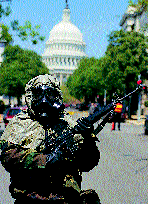West Nile virus is a mosquito-borne virus that can cause encephalitis
(inflammation of the brain) or meningitis (inflammation of the lining
of the brain and spinal cord). West Nile encephalitis is an infection
of the brain caused by West Nile virus, a flavivirus commonly found
in Africa, West Asia, and the Middle East. It is closely related to
St. Louis encephalitis virus found in the United States.
Symptoms
West Nile virus symptoms generally occur 5 to 15 days after being
bitten by an infected mosquito. Following transmission by an infected
mosquito, West Nile virus multiplies in the person's blood system
and crosses the blood-brain barrier to reach the brain. The virus
interferes with normal central nervous system functioning and causes
inflammation of brain tissueMost people who are infected with the
West Nile virus have no symptoms or may experience mild illness such
as a fever, headache and body aches before fully recovering. Some
persons also develop a mild rash or swollen lymph glands. In some
individuals, particularly the elderly, West Nile virus can cause serious
disease that affects brain tissue. At its most serious, it can cause
permanent neurological damage and can be fatal. Encephalitis (inflammation
of the brain) symptoms include the rapid onset of severe headache,
high fever, stiff neck, confusion, loss of consciousness (coma), muscle
weakness, or possibly death. Among those with severe illness due to
West Nile virus, case-fatality rates range from 3% to 15% and are
highest among the elderly. Less than 1% of those infected with West
Nile virus will develop severe illness
Transmission
West Nile virus is spread to humans by the bite of an infected
mosquito. A mosquito becomes infected by biting a bird which carries
the virus . You cannot get West Nile virus from a person who has the
disease. West Nile virus is not spread by person-to-person contact
such as touching, kissing, or caring for someone who is infected.
Diagnosis
Clinical presntation of symptoms.
Treatment
Although there is no specific treatment, medication or cure, the
symptoms and complications of the disease can be treated. Most people
who get this illness recover from it.
Prevention
Use insect repellants with no more than 30% DEET (N, N-diethyl-meta-toluamide).
Use 15% or less DEET for children. Do not use DEET on infants. Insect
repellants should be used during the dusk and evening hours when mosquitoes
are most likely to bite. Be sure to read and follow the manufacturer's
directions for use. If you are outdoors, wear protective clothing
such as long pants, long-sleeved shirts, and socks. Mosquitoes like
to breed in stagnant water. Remove outside objects such as empty buckets,
old tires, and any other containers in which water accumulates and
where mosquitoes may breed. (If these receptacles can not be removed,
they should be emptied, turned over or covered so that water cannot
collect in them.) Clean and empty water from clogged roof gutters.
Change the water in bird baths every other day. Keep swimming pools
clean and chlorinated, or drain and cover them if they are not being
used. Make sure that door and window screens do not have holes and
fit tightly in your windows.

